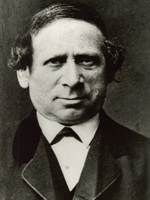Theodor Benfey
Theodor Benfey (born January 28, 1809 in Nörten near Göttingen , † June 26, 1881 in Göttingen) was a German orientalist and linguist.
Benfey, son of a Jewish businessman, studied classical philology in Göttingen and Munich , then lived in Frankfurt am Main and Heidelberg , where he studied comparative language studies. He completed his habilitation in 1834 in Göttingen for Sanskrit and comparative linguistics. After converting to Christianity (ev.) In 1846 with his wife and four children, he was appointed associate professor in 1848 and full professor in 1862, and as a teacher had a great influence - especially on the development of Indology - until his death.
The list of his publications is long and shows the wide range of his interests: from the Sanskrit of the Vedas to ancient Persian cuneiform monuments , the development of the ancient Greek language to the roots of the Semitic language families. Through his investigations into the history of fairy tale literature , in part many others were encouraged to do similar research, in part Benfey continued the same in numerous essays, especially in the advertisements taught in Göttingen and in the magazine Orient und Occident, which he himself published .
Through his work on Indian fairy tale and narrative literature, especially Panchatantra , Benfey became the founder of comparative fairy tale research . Since he succeeded in identifying the sources of many of the narratives in this text and in tracing their history of circulation, he achieved significant things, but the theoretical positions and methodological approach he advocated (so-called “ Indian theory ”) are largely out of date. His basic assumption was that Buddhist literature in India was the starting point of almost all fairy tales and that these only reached the West in writing in the Middle Ages. With this wandering theory he continued the theses already encountered by the Brothers Grimm - but remained a resolute opponent of the Indo-European theory of the brothers.
Of his earlier publications, the following should be emphasized: Greek root lexicon (Berlin 1839-42), which received the Volney Prize, On the relationship between the Egyptian language and the Semitic language stem (Leipzig 1844), The Persian cuneiform inscriptions with translation and glossary (that. 1847), The Hymns of Sâma Veda (das. 1848, a basic work for the study of the oldest Indian literature), handbook of the Sanskrit language (das. 1852–54), also Pantschatantra. Five books of Indian fables, fairy tales and stories (Leipzig 1859).
literature
- Willibald Kirfel: Benfey, Theodor. In: New German Biography (NDB). Volume 2, Duncker & Humblot, Berlin 1955, ISBN 3-428-00183-4 , p. 46 f. ( Digitized version ).
- Adalbert Bezzenberger: Benfey, Theodor . In: Allgemeine Deutsche Biographie (ADB). Volume 46, Duncker & Humblot, Leipzig 1902, p. 358 f.
- Benfey, Theodore. In: Lexicon of German-Jewish Authors . Volume 2: Bend Bins. Edited by the Bibliographia Judaica archive. Saur, Munich 1993, ISBN 3-598-22682-9 , pp. 31-50.
Web links
- Literature by and about Theodor Benfey in the catalog of the German National Library
- Works by and about Theodor Benfey in the German Digital Library
Individual evidence
- ↑ Peter Aufgebauer : Baptism of Jews in the vicinity of the Göttingen University . In: Conversions of Jews to Christianity in Northwest Germany , ed. by Werner Meiners (Publications of the Historical Commission for Lower Saxony and Bremen 246), Hanover 2009, pp. 201–209.
| personal data | |
|---|---|
| SURNAME | Benfey, Theodore |
| BRIEF DESCRIPTION | German orientalist and linguist |
| DATE OF BIRTH | January 28, 1809 |
| PLACE OF BIRTH | Nörten near Göttingen |
| DATE OF DEATH | June 26, 1881 |
| Place of death | Goettingen |


